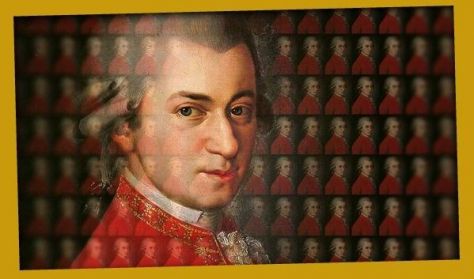
Mozart Day - 5
Mozart: Cassation in G major, K. 63
Mozart: Adagio and Fugue, C minor, K. 546
Mozart: Piano Concerto No. 16 in D major, K. 451
more

Mozart: Cassation in G major, K. 63
Mozart: Adagio and Fugue, C minor, K. 546
Mozart: Piano Concerto No. 16 in D major, K. 451
more
Ön egy múltbeli eseményre keresett rá. Kérjük, válogasson aktuális kínálatunkból a Jegy.hu keresőjében!
Last event date: Sunday, March 10 2019 4:00PM
4 pm Grand Hall – Mozart Day - 5
Mozart: Cassation in G major, K. 63
Mozart: Adagio and Fugue, C minor, K. 546
Mozart: Piano Concerto No. 16 in D major, K. 451
Featuring: Ferenc Rados
Concerto Budapest
Concertmaster: Arvid Engegård
Wolfgang Amadeus Mozart: Cassation in G major, K. 63
Cassation (the name was primarily used in southern Germany) is a serenade-type genre mostly for outdoor performance. Its first movement is generally a march, there is no fixed number of movements and typically two minuets (as we see with Mozart). The Cassation in G major dates from summer 1769 along with two other cassations.
Wolfgang Amadeus Mozart: Adagio and Fugue, C minor, K. 546
Baron Gottfried van Swieten, one of Mozart’s most important patrons in Vienna, served in Berlin as imperial ambassador in the 1770s. Here he came into contact with music circles particular attracted to the greats of the past, for example, Händel and Bach. From 1782, Mozart was a regular guest of Swieten, he studied the baron’s collection of sheet music, wrote arrangements of several works, and made the high-level fugue technique a natural part of his own style. In late 1783, he wrote a fugue for two pianos (K. 426) – it is not known whether there was a specific reason for the work, or it was commissioned. The theme of the composition in C minor is a typical Baroque fugue; we can find several variations of it in pieces by Bach and Händel as well as several ‘archaic’ works by Haydn (for example, in the fugue finale of the 1772 String Quartet in F minor). Mozart himself took advantage of the compositional opportunities inherent in the theme type in several of his works, the last one being in the Kyrie fugue of Requiem in 1791. In 1788, he went back to the Fugue in C minor for double piano and rearranged it for string quartet, plus he composed a dignified, dramatic prelude (overture) for it. It was published in this form.
Wolfgang Amadeus Mozart: Piano Concerto No. 16 in D major, K. 451
Mozart composed the Piano Concerto in D major for himself, for his academy (composer’s recital) in summer 1784. The bright, generously orchestrated piece – especially as regards the wind instruments – is eloquent testimony to the exceptional tonal imagination of the composer. After the concert organized in the Burgtheater, he wrote proudly to his father: “The theatre concert was a big success. If only you could have heard it!”
BACH / BEETHOVEN / STRAVINSKY // Tetzlaff / Keller J. S. BACH: Contrapunctus XIX (A fúga művészetéből, Luciano Berio feldolgozásában) BEETHOVEN : D-dúr hegedűverseny, op. 61 J. S. BACH: Két prelúdium és fúga a Das Wohltemperierte Klavierből (Stravinsky feldolgozásában) STRAVINSKY: Tavaszi áldozat
SCHUBERT / MENDELSSOHN / CSAJKOVSZKIJ // Hadelich / Keller SCHUBERT: 3. szimfónia MENDELSSOHN: e-moll hegedűverseny, op. 64 CSAJKOVSZKIJ: 4. szimfónia
Koncertünk témája a TŰZ – Parázslik, szikrázik, lángol
Bach-hegedűversenyek ----------szünet Muzsikás együttes
Mendelssohn: e-moll hegedűverseny, op.64 Nádor Mihály: Hegedűverseny, op.6 Csajkovszkij: D-dúr hegedűverseny, op.35
Hubay: III. hegedűverseny, op.99 Bruch: Kettősverseny hegedűre és brácsára Sibelius: d-moll hegedűverseny, op.47
item(s) in basket
total:
Time limit has expired. Please, put item(s) in to basket again.